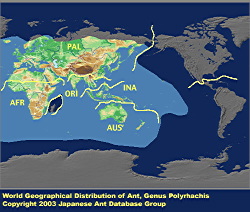
|
genus
|
Polyrhachis
|
 |
Japanese Name
|
Toge-ari-zoku
|
Original Reference
|
|
Smith, F. (1857) Catalogue of the hymenopterous insects collected at Sarawak, Borneo; Mount Ophir, Malacca; and at Singapore, by A.R. Wallace. Journal of the Proceedings of the Linnean Society of London, Zoology 2: 42-88.
|
Description
|
|
Medium to large ants: total length of workers around 5 - 10 mm. Eyes developed, ocelli absent. Antennae 12-segmented. Antennal insertions situated far from posterior margin of clypeus. Palpal formula 6:4. Mesosoma often with spines on one or more of its pronotal, mesonotal or propodeal components. Petiole armed with spines or teeth. First gastral tergite well developed, longer in dorsal view than exposed parts of the following terga together. Opening at gastral apex for release of venom lacking a radial fringe of hairs.
|
|

|
Remarks
|
|
Nesting habits range from arboreal to subterranean. Some arboreal species build carton nests or weave leaves together using larval silk. Polyrhachis includes about 480 named species. The genus is distributed mostly in tropical and subtropical areas, excluding those of the New World. Although Polyrhachis is often divided into as many as 14 subgenera (Hung, 1967; Bolton, 1973), subgeneric definitions are often obscure and impractical in application (Kohout & Taylor, 1990). Bolton (1973) revised the 42 recognized Afrotropical species. Kohout & Taylor (1990) reviewed 114 listed Australian species. The taxonomy of a few species groups represented in the large Asian fauna has been reviewed (Bolton, 1975; Hung, 1970; Kohout, 1988, 1990), but Asian Polyrhachis taxonomy is otherwise largely unresolved. There are four known Japanese species in three subgenera: Polyrhachis, Myrma and Myrmhopla.
|
References
|
|
- Hung, A. C. F. (1967). A revision of the ant genus Polyrhachis at the subgeneric level (Hymenoptera: Formicidae). . Trans. Amer. Ent. Soc., 93, 395-422.
- Bolton, B. (1973). The ant genus Polyrhachis F. Smith in the Ethiopian Region (Hymenoptera: Formicidae). Bull. Br. Mus. Nat. Hist. (Ent.), 28, 285-369.
- Kohout, R. J. & R. W. Taylor (1990). Notes on Australian ants of the genus Polyrhachis Fr. Smith, with a synonimic list of the species (Hymenoptera: Formicidae: Formicinae). . Mem. Queensland Mus., 28, 509522.
- Bolton, B. (1975). The sexspinosa-group of the genus Polyrhachis F. Smith (Hym., Formicidae). . J. Ent. (B) , 44, 1-14.
- Hung, A. C. F. (1970). A revision of the ants of the subgenus Polyrhachis F. Smith. . Orient. Insects, 4, 1-36.
- Kohout, R. J. (1988). A new species of Polyrhachis (Polyrhachis) from Papua New Guinea with a review of the New Guinean and Australian species (Hymenoptera: Formicidae: Formicinae). . Mem. Queensland Mus., 25, 417427.
- Catalogue of the hymenopterous insects collected at Sarawak, Borneo; Mount Ophir, Malacca; and at Singapore, by A.R. Wallace. Journal of the Proceedings of the Linnean Society of London, Zoology 2: 42-88.
- Kohout, R. J. (1990). A review of the Polyrhachis viehmeyeri species-group (Hymenoptera: Formicidae: Formicinae). . Mem. Queensland Mus., 28, 499508.
|
Editor
|
|
Original text by Mamoru Terayama and Masao Kubota. English translation by Mamoru Terayama, edited by Robert W. Taylor
|
|